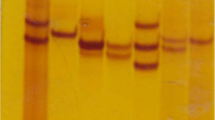Abstract
Purpose
The p53 tumor suppressor gene plays two important roles in genomic stability: blocking cell proliferation after DNA damage until it has been repaired, and starting apoptosis if the damage is too critical. A recent report suggests that a polymorphism of the p53 tumor suppressor gene that results in the substitution of a proline residue with an arginine residue at position 72 of the p53 protein might act as a risk factor in the malignant transformation of colorectal adenoma to cancer.
Methods
In our study, the samples consisted of 150 patients were analyzed for the mutation in the p53 gene. The age of 150 patients (46 women and 104 men) ranged from 30 to 91 years (mean age 68.46 years).
Results
The polymorphism showed 52.04% mutant in the codon 72 of exon 4 in the Taiwanese population. Both of the chi-square for trend test (chi-square=4.97, p=0.034) and logistic regression (p=0.037, odds ratio=1.699) showed significant differences in the distribution of polymorphism of codon 72 in the p53 gene and Dukes classification of colorectal cancer.
Conclusions
There were significant relationship between the polymorphism of codon 72 and the malignancy of colorectal cancer in Taiwanese population. There is 1.70 times in each grade change (Dukes A–D) more risk of CCC polymorphism than that of CCG polymorphism of codon 72 of exon 4.

Similar content being viewed by others
References
Buller RE, Sood A, Fullenkamp C, Sorosky J, Powills K, Anderson B (1997) The influence of the p53 codon 72 polymorphism on ovarian carcinogenesis and prognosis. Cancer Gene Ther 4:239–245
Chang FH, Tzeng DS,Lee TM, Chen TC, Hsu LS, Lung FW (2003) Mutations in the p53 tumor suppressor gene in colorectal cancer in Taiwan. Kaohsiung J Med Sci 19:151–158
Fearon ER, Hamilton SR, Vogelstein B (1987) Clonal analysis of human colorectal tumors. Science 328:193–197
Hao XP, Ilyas M, Talbot IC (1997) Expression of Bcl-2 and p53 in the colorectal adenoma-carcinoma sequence. Pathobiology 65:140–145
Hao XP, Frayling IM, Sgouros JG, Du MQ, Willcocks TC, Talbot IC, Tomlinson IPM (2002) The spectrum of p53 mutations in colorectal adenomas differs from that in colorectal carcinomas. Int J Gastroenterol Hepatol 56:834–839
Harris N, Brill E, Shohat O, Prokocimer M, Wolf D, Arai N, Rotter V (1986) Molecular basis for heterogeneity of the human p53 protein. Mol Cell Biol 6:4650–4656
Hollstein M, Sidransky D, Vogelstein B, Harris CC (1991) p53 mutations in human cancers. Science 253:49–53
Jin X, Roth JA, Amos CI, King TM, Branch C, Honn SE, Spitz MR (1995) Higher lung cancer risk for younger African Americans with the Pro/Pro p53 genotype. Carcinogenesis 16:2205–2208
Knudson AG (1985) Hereditary cancer, oncogens, and antioncogenes. Cancer Res 45:1437–1743
Levine AJ (1993) The tumor suppressor genes. Annu Rev Biochem 62:623–651
Levine AJ (1997) P53, the cellular gatekeeper for growth and division. Cell 88:323–331
Matlashewski GJ, Tuck S, Pim D, Lamb P, Schneider J, Crawford LV (1987) Primary structure polymorphism at amino acid residue 72 of human p53. Mol Cell Biol 7:961–963
O’Connor DP, Kay EW, Leader M, Atkins GJ, Murphy GM, Mabruk MJEMF (2001) P53 codon 72 polymorphism and human papillomavirus associated skin cancer. J Clin Pathol 54:539–542
Orita M, Iwahana H, Kanazawa H, Hayashi K, Sekiya T (1989) Detection of polymorphisms of human DNA by gel electrophoresis as single-strand conformation polymorphisms. Proc Natl Acad Sci USA 86:2766–2770
Pignatelli M, Stamp GW, Kafiri G, Lane D, Bodmer WF (1992) Over-expression of p53 nuclear oncoprotein in colorectal adenomas. Int J Cancer 50:683–688
Rosenthal AN, Ryan A, Al-Jehani RM, Storey A, Harwood CA, Jacobs IJ (1998) P53 codon 72 polymorphism and risk of cervical cancer in UK. Lancet 352:871–872
Russell SB, Trupin KM, Rodriguez-Eaton S, Russell JD, Trupin JS (1988) Reduced growth-factor requirement of keloid derived fibroblasts may account for tumor growth. Proc Natl Acad Sci USA 85:587–591
Sinicrope FA, Ruan SB, Cleary KR, Stephens LC, Lee JJ, Levin B (1995) bcl-2 and p53 oncoprotein expression during colorectal tumorigenesis. Cancer Res 55:237–241
Sjalander A, Birgander R, Hallmans G, Cajander S, Lenner P, Athlin L, Beckman G, Beckman L (1996) P53 polymorphisms and haplotypes in breast cancer. Carcinogenesis 17:1313–1316
Sorensen DM, Lewark TM, Haney JL, Meyers AD, Krause G, Franklin WA (1997) Absence of p53 mutations in squamous carcinomas of the tongue in nonsmoking and nondrinking patients younger than 40 years. Arch Otolaryngol Head Neck Surg 123:503–506
Storey A, Thomas M, Kalita A, Harwood C, Gardiol D, Mantovani F, Breuer J, Leigh IM, Matlashewski G, Banks L (1998) Role of a p53 polymorphism in the development of human papillomavirus-associated cancer. Nature 393:229–334
Ulrik L, Hanna F, Nikos P, Adel G, Henrik Z, Hans O (2000) Allelic loss is heterogeneous throughout the tumor in colorectal carcinoma. Cancer 88:2661–2667
Vogelstein B (1990) Cancer. A deadly inheritance. Nature 348:681–682
Wang YC, Lee HS, Chen SK, Chang YY, Chen CY (1999) Prognostic significance of p53 codon 72 polymorphism in lung carcinoma. Eur J Cancer 5:226–230
Author information
Authors and Affiliations
Corresponding author
Rights and permissions
About this article
Cite this article
Lung, FW., Lee, TM., Shu, BC. et al. p53 codon 72 polymorphism and susceptibility malignancy of colorectal cancer in Taiwan. J Cancer Res Clin Oncol 130, 728–732 (2004). https://doi.org/10.1007/s00432-004-0605-4
Received:
Accepted:
Published:
Issue Date:
DOI: https://doi.org/10.1007/s00432-004-0605-4




